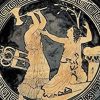He agrees but first wants to know why Clytaemestra sent libations to the grave of the man whom she murdered, especially since she can never atone for his death. The chorus answer that it was because of a dream that terrified her the night before. In it, Clytaemestra gave birth to a serpent. She wrapped the serpent in infant’s swaddling clothes and nursed it at her breast, but it drew forth blood along with the milk.
This is no empty dream, says Orestes, but a true vision sent by his father. He hopes that he will be able to fulfill the dream and interprets the serpent to represent himself and the blood as a sign that he will kill Clytaemestra. Now, Orestes says, he must transmute his own nature and become like a serpent.
Orestes quickly lays his plans. It is necessary that those who killed by treachery must themselves be killed by treachery, for so Apollo has ordained. He tells Electra to keep his return a secret and go back to the palace where she can stay on guard for any developments that might be important. Meanwhile, he and Pylades, disguised as travelers from Phocis and speaking the Phocian dialect, will appear at the door of the palace, and seek admittance. After that, he will take the first opportunity that arises to kill Aegisthus and Clytaemestra. He instructs the chorus to remain silent and not to get involved unless circumstances are such that they can assist in the furtherance of his plans.
Analysis
Clytaemestra’s dream is a good illustration of how the poetic imagery of Aeschylus intensifies the meaning of his tragedies. In an earlier scene, Orestes referred to his mother as “the deadly viper” who devoured Agamemnon. In the dream, she is destroyed by a serpent, her own offspring. This is a symbolic description of the insidious and deadly hereditary curse on the House of Atreus. It is also an expression of Clytaemestra’s guilty conscience and ambiguous feeling toward her son that can be meaningfully elaborated in Freudian terms.

